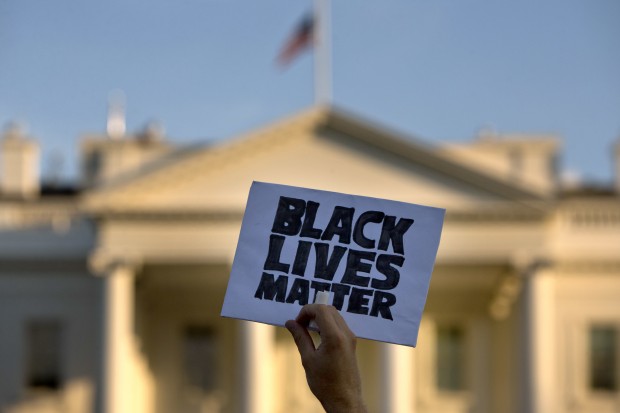Black Lives Matter for Asians too

In this July 8, 2016, photo, a man holds up a sign saying “black lives matter” during a protest of shootings by police, in Washington by the White House. When it comes to picking a new president, young people in America are united in saying education is what matters most. But there’s a wide split in what else will drive their votes. The poll showed major support for the Black Lives Matter movement among African-Americans polled — 84 percent. Support for Black Lives Matter polled at 68 percent for Asian-Americans, 53 percent for Hispanics and 41 percent for whites. (AP Photo/Jacquelyn Martin)
Recent police shootings in the United States have brought to the fore many social issues the country faces today. Not only did the events highlight racial tensions and inequalities, but also the distrust people of color have towards the rule of law and impartial justice. Furthermore, US democracy is floundering in election year politicking, as evidenced by the Obama administration’s inability to nominate a Supreme Court Justice. Bernie Sander’s wild ride to the Democratic Convention, though ultimately unsuccessful, remains a silver lining which showed increasing engagement with public discourse from young voters.
Racism against people with darker skin in the United States has a long and painful history. From its inception in the slave trade, through the Civil War, segregation, and the civil rights movement, Black Americans have had to fight for their rights at every turn to be treated like regular citizens. “Black Lives Matter” is an activist movement organized on social media after the acquittal of George Zimmerman in the shooting death of a Black teenager Trayvon Martin. The movement asserts that Black lives are mistreated and underserved by the police and the judicial system.
The Guardian reported at the end of 2015 that “despite making up only 2% of the total US population, African American males between the ages of 15 and 34 comprised more than 15% of all deaths logged this year by an ongoing investigation into the use of deadly force by police. Their rate of police-involved deaths was five times higher than for white men of the same age.” As the election approaches, both supporters and detractors of the Black Lives Matter movement are organizing and tensions are escalating.
A group of young Asian Americans has organized through the internet to crowdsource a letter of support for the Black Lives Matter movement. The letter is titled “Dear Mom, Dad, Uncle, Auntie: Black Lives Matter to Us, Too,” and is addressed from “your children,” with love and hope. The letter offers a stark reality: Over 500 people have been killed by police in 2016, a quarter of those killed were Black, and the majority of the police officers will never be prosecuted.
The letter describes the context for the Black Lives Matter movement and offers some answers to questions commonly asked by Asian Americans who are less than sympathetic towards Black Lives Matter. The letter argues that although Asian Americans also face much discrimination in mainstream American society, Asian Americans 1) immigrated to the United States by choice 2) are not generally stereotyped as “dangerous criminals,” and 3) benefit from civil rights that Black activists have fought for. Young Asian Americans plead with the older generation to recognize and sympathize with the deep injustices that Black Americans face and the importance of solidarity for equality under the law.
As evidenced by Donald Trump’s success in the Republican convention, there is great dissatisfaction among white voters about their economic position, cultural space, and political power. Most pundits agree that racism and Black struggle for full equality will be a contentious issue in the United States for the foreseeable future. According to the 2015 US Census, deaths are exceeding births among non-Hispanic whites, and estimates show that white people are becoming a demographic minority in the United States in 30 years or so. As those years countdown, racial tensions will shift and realign with demographic changes. The activism of young Asian Americans, as evidenced in recent efforts, will continue to be a valuable source of hope and change.
Suk Hee Yoon – AsiaN New York Correspondent





















































